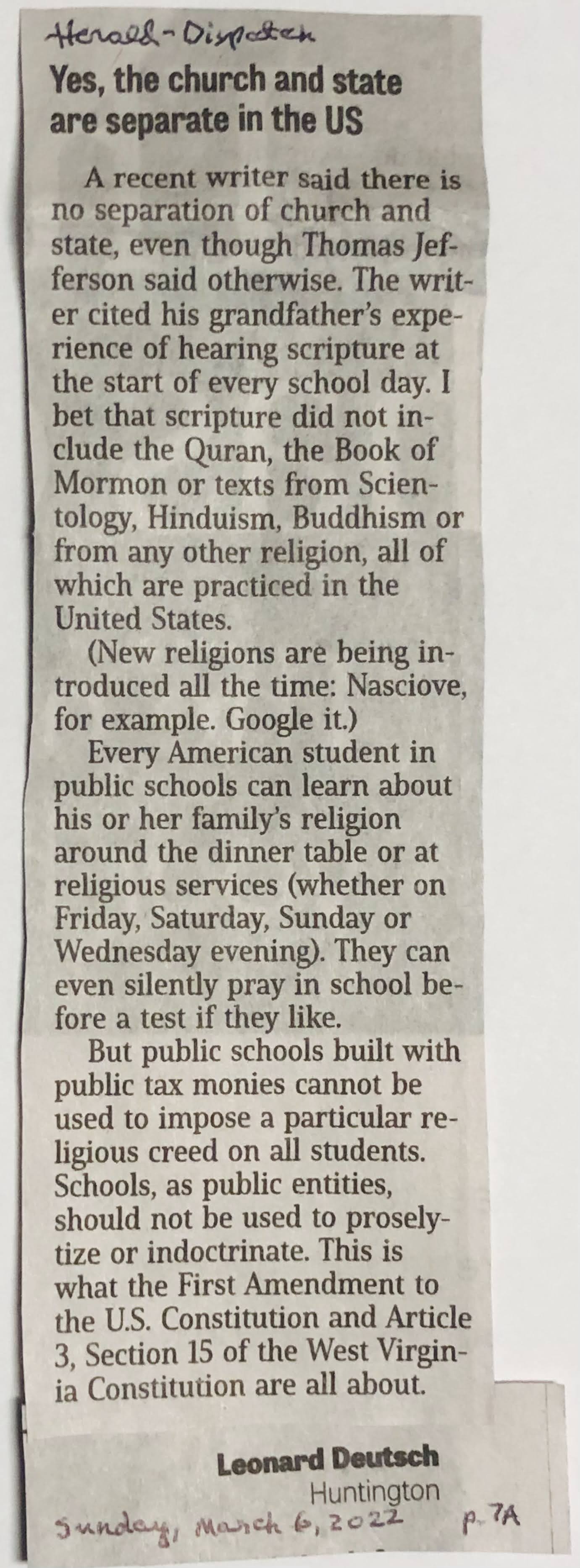|
----- Original Message ----- From: Deutsch To: letters@herald-dispatch.com Cc: Deutsch Sent: Monday, August 17, 2009 7:21 PM Subject: Voice of the People
I would like to endorse a recent letter calling for a referendum on gay marriage. In any democracy, the rights of the majority should prevail over the agendas of minorities. This is why Muslims--whose views undermine traditional Christianity--should also be stripped of their right to vote.
If Hitler had been smart, he would have put Jewish rights up for a vote. That way, the holocaust would been perfectly legal. It's a shame when the Supreme Court intervenes and gives rights to subversive groups like the Jehovah's Witnesses. Why shouldn't they be compelled to salute the flag like everyone else?
What gays don't understand is that under the American Constitution only the majority has rights. Maybe we can restore segregation--better yet, slavery--if that is what the majority votes for. Let's go back to the good old days.
Leonard Deutsch
----- Original Message ----- From: Deutsch To: letters@herald-dispatch.com Cc: Deutsch Sent: Tuesday, August 25, 2009 11:00 AM Subject: Re: Voice of the People
You have published some nonsense about meteorology and God and Rev. Bartholomew's letter but not mine. I wonder why. Do you think it is because readers will miss the irony and take it literally?
Sincerely, Len Deutsch
A day or two later, Les Smith, the Managing Editor of the
Herald-Dispatch called me. He acknowledged that he (and several
other people in the newsroom) did not know how to "take" my letter.
He said they read it a number of times and still were not sure
whether I was serious or not. They concluded that the letter was
probably satirical but they were afraid that many of their readers
would misinterpret my intent. They feared that my letter would do
more harm than good. Mr. Smith invited me to rewrite it and then
resubmit it. I thought about doing so but decided it would not have
the same "bite". So, I did not tame it down or resubmit it.
I wrote the following: Let reason, science guide behaviors
Oct. 18, 2013
A recent contributor to The Herald-Dispatch acknowledged that the Bible is "composed of many books, in many genres, by many human authors, at many different times." As scholars have consistently demonstrated, there are numerous Biblical texts in a variety of languages and translations, written over an extended period of time -- most of it before the birth or after the death of Christ. A rational approach to the Bible would be to see it as a sociological reflection of the times in which it was written. In that context, the Old Testament helped the Jews survive as a people. "The Chosen People" were enjoined to increase and multiply. In order to do so, they had to avoid behaviors that did not lead to reproduction -- such behaviors as onanism and homosexuality. Strictures that made sense thousands of years ago may not make sense now. They may, in fact, be repressive -- and even counterproductive in a world where the population is expected to exceed 10 billion people by the year 2050. Christian readers may wish to consult "The Jefferson Bible." Thomas Jefferson, chief author of the Declaration of Independence, devised a version of the Bible that focused on the moral precepts of Jesus and eschewed the supernatural. Jefferson's idea was to find the best in ethical instruction and apply it to everyday life. Instead of demonizing those who do not toe the Biblical line, perhaps we would all be better off following reason, science and the most universally sound moral principles that religious and secular texts have to offer.
Leonard Deutsch
In response to: David Robbins: Bible portrays an extraordinary and powerful God
Oct. 12, 2013
Are the stories in the Bible true? How should we understand them? These are worthy questions, and I'd like to thank Milt Hankins for bringing them up in a recent column. Although I disagree with many of his answers, I appreciate his concern for sound Bible interpretation. Different things have to be read in different ways. For instance, you wouldn't read this column the same way, or with the same expectations, as you might read Harry Potter. Of course, you might conclude that what I have to say is fiction, possibly even a tragedy, but it certainly isn't a novel. The same goes for other sections of the newspaper: You don't turn to the funnies for in-depth reporting, just as you wouldn't scour the classifieds for the latest on the Herd. What about the Bible? It is a single book, composed of many books, in many genres, by many human authors, at many different times. The writers were a diverse lot, but they knew what they were doing; they could distinguish between historical narrative, poetry, metaphor, prophecy and so forth, all of which you'll find in the Bible, sometimes even in the same book. Each text invites the sincere reader to ask the questions: What is the author actually trying to say, and what am I supposed to do with it? As with anything worth reading, anytime we open up the Bible, our objective should be to try to get out of the way and let the author speak to us. Some of the stories the Bible presents as historical fact are startling, to say the least. But if your eyebrows curl up into question marks when you read them -- think, for instance, of the classic and oft-ridiculed tale of a prophet named Jonah who was swallowed by a giant fish, and lived to tell the tale -- then you're actually getting the point. The last thing anyone could say the Bible does is offer a conventional, tame, run-of-the-mill portrait of the God it says it represents. Quite the opposite: If the historical claims of the Bible are true, as the writers clearly believed them to be, then God is anything but ordinary, and we ought to bow before him in worship. The Bible constantly maintains that God is gloriously extraordinary, that it is a book from him and about him, and that it faithfully records his mighty acts in history. In other words, everything about it is supernatural. Reject the supernatural, and you'll tend to mythologize its plain meaning, question its accuracy, or throw it out altogether; but the one thing you won't do is understand it, at least not on its own terms. The religion of the Bible can be disbelieved, but it may not be domesticated by the reader; it speaks for a God who is sovereign, supernatural and vastly more wonderful than we imagine him. Dethrone him, strip him of his power, bar him from doing anything that might not appeal to our modern and supposedly more enlightened tastes, and all that remains is the lonely corpse of the Christian faith. Christianity without the supernatural God of the Bible is another religion altogether; it is a cruel and pathetic joke. I humbly contend that it is nothing of the sort. The Bible is not a book of outdated stories, an archaic playground for sterile theories or personal agendas, but a true record of facts and actual events that reveal an extraordinary, infinitely mighty God. It is not our place to inspect him under the microscope of human understanding, but to seek him and adore him. David J. Robbins is pastor of Trinity Presbyterian Church (OPC) of Huntington. |
Former President Trump has not been exonerated
Mar. 5, 2021
 |
Yes, church and state are separate in the US
May. 6, 2022
 |
'America First' is a selfish
|
Don't forget Ukraine
Feb. 12, 2026
 |
||
